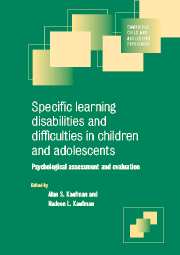 Specific Learning Disabilities and Difficulties in Children and Adolescents
Specific Learning Disabilities and Difficulties in Children and Adolescents Book contents
- Frontmatter
- Contents
- List of contributors
- Preface
- Part I History and Tradition
- Part II Alternative Cognitive Approaches to Learning Disabilities Assessment and Remediation
- 3 Application of the Woodcock—Johnson Tests of Cognitive Ability—Revised to the diagnosis of learning disabilities
- 4 The Kaufman tests — K-ABC and KAIT
- 5 Using the Cognitive Assessment System (CAS) with learning-disabled children
- 6 Application of the Differential Ability Scales (DAS) and British Ability Scales, Second Edition (BAS II), for the assessment of learning disabilities
- 7 Is dynamic assessment compatible with the psychometric model?
- 8 Multi-perspective, clinical—educational assessments of language disorders
- Part III Neuropsychological Approaches to Learning Disabilities Assessment and Remediation
- Part IV Integration and Summation
- Index
7 - Is dynamic assessment compatible with the psychometric model?
from Part II - Alternative Cognitive Approaches to Learning Disabilities Assessment and Remediation
Published online by Cambridge University Press: 06 January 2010
- Frontmatter
- Contents
- List of contributors
- Preface
- Part I History and Tradition
- Part II Alternative Cognitive Approaches to Learning Disabilities Assessment and Remediation
- 3 Application of the Woodcock—Johnson Tests of Cognitive Ability—Revised to the diagnosis of learning disabilities
- 4 The Kaufman tests — K-ABC and KAIT
- 5 Using the Cognitive Assessment System (CAS) with learning-disabled children
- 6 Application of the Differential Ability Scales (DAS) and British Ability Scales, Second Edition (BAS II), for the assessment of learning disabilities
- 7 Is dynamic assessment compatible with the psychometric model?
- 8 Multi-perspective, clinical—educational assessments of language disorders
- Part III Neuropsychological Approaches to Learning Disabilities Assessment and Remediation
- Part IV Integration and Summation
- Index
Summary
Avtalyon said: Scholars, be careful with your words! You may incur the penalty of exile and be banished to a place of evil waters and the disciples who follow you into exile are likely to drink of them and die …
(Ethics of the Fathers, I, 11).This paper, presenting our stance towards dynamic assessment, is dedicated to two of our most devoted colleagues and supporters: Dr David Krassilovsky, MD, z'al, renowned psychiatrist, former head of Talbieh Hospital, a founding member and long-time Associate Director of the International Center for the Enhancement of Learning Potential, and Mr Shimon Tuchman, z'al, former Deputy Director General of Youth Aliyah who was deeply involved in the development of the center. They both contributed to making our experimental, clinical, and empirical work possible. May this paper keep their memory alive and be a blessing to the continuation of our work.
Summary
The purpose of this chapter is to examine the risks involved in using the psychometric model in shaping the dynamic assessment of cognitive development. It is shown that the psychometric definition of intelligence as a stable trait classifies individuals as a function of their manifest level of functioning. By contrast, the definition of intelligence as a cluster of states that governs the Learning Propensity Assessment Device and the theory of Structural Cognitive Modifiability which underlies it evaluates an individual's propensity for modifiability.
- Type
- Chapter
- Information
- Specific Learning Disabilities and Difficulties in Children and AdolescentsPsychological Assessment and Evaluation, pp. 218 - 246Publisher: Cambridge University PressPrint publication year: 2001
- 4
- Cited by
